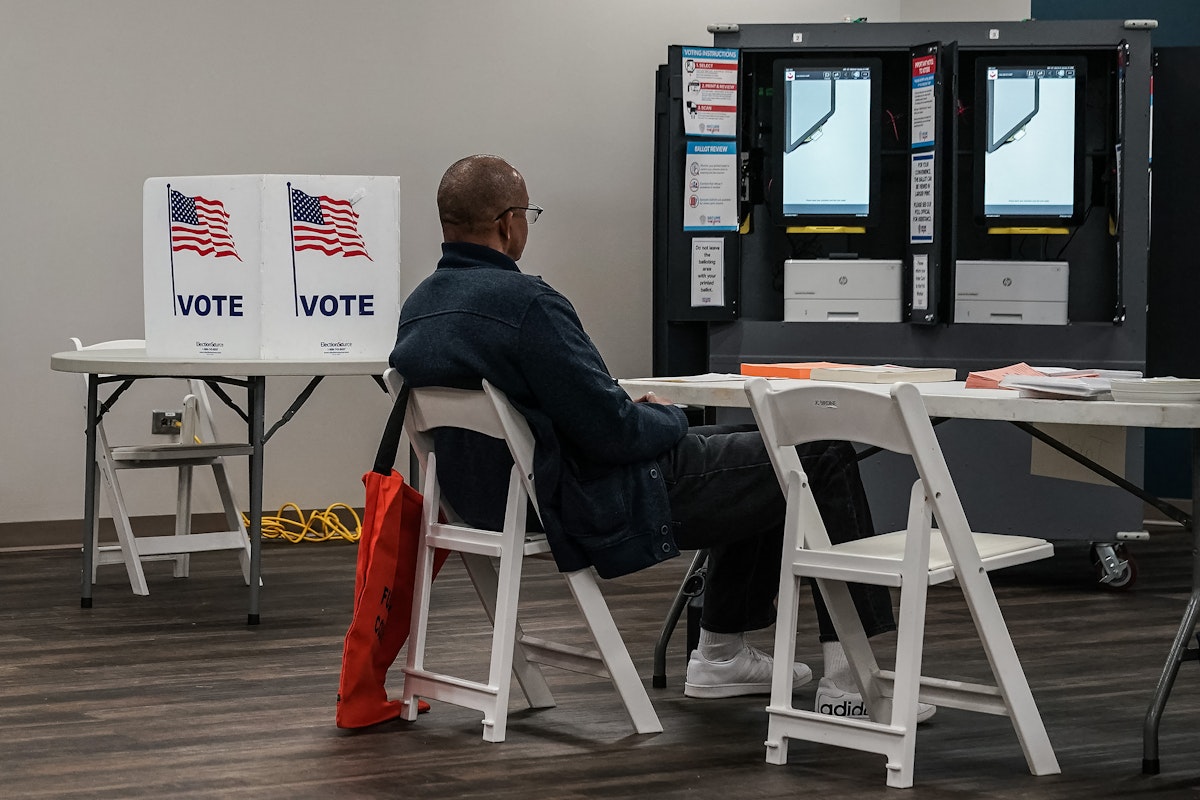Georgia Republicans Pass Bill Making It Easier to Purge Votes in 2024
Georgia Republican lawmakers, in the dead of night, passed a bill that will make it easier to challenge a voter’s registration, dealing a huge blow to voting rights just months before the 2024 election.The measure, which has already passed the Senate, also passed the House along party lines early Friday, despite opposition from Secretary of State Brad Raffensperger. If Georgia Governor Brian Kemp signs the bill into law, it will go into effect on July 1.The bill increases the number of reasons that a person’s voter registration can be challenged, such as registering in another state or jurisdiction, using a different residence to obtain a homestead tax exemption, or registering at a nonresidential address. In smaller Georgia towns, where there aren’t enough residents in the zip code for the post office to deliver mail to home addresses, many residents use their post office box as their voter registration address. This would also be banned.The measure would require homeless people to use the country registrar’s office as their voting address, which could be complicated for both the registrars and the people trying to register. This requirement could also violate the National Voter Registration Act.The bill would make other changes to Georgia’s voting laws, including requiring that the printed text on a ballot be used to count votes, instead of a scannable bar code, and requiring absentee and advanced ballots to be counted within one hour of polls closing on Election Day.Voting rights advocates have slammed both the bill and Republicans for seeking to create more barriers to voting. Andrea Young, the executive director of the American Civil Liberties Union of Georgia, warned the bill would encourage “anti-democratic vigilantes to come in and challenge your right to be on the voting list.”“What we’re saying is that it should be easy for every citizen to vote,” she told The Guardian. “That’s what makes this a democracy. And all of these tricks to try to create barriers for Georgia citizens to have a voice in their government is anti-democracy.”Since the 2020 election, Republicans across the country have tried to pass restrictions on voting, particularly mail-in and advanced voting. While the GOP lawmakers claim they are trying to protect the integrity of U.S. elections, the real effect of their actions has been to make it that much harder for many people, especially people of color, to vote.Ironically, the measure passed Georgia’s House of Representatives just days after a judge determined that a state resident had voted illegally. Brian Pritchard, the first vice chairman of the state Republican Party, violated state election laws when he voted illegally in nine elections from 2008 to 2010. At the time he cast those votes, Pritchard was still on probation after being convicted of a forgery felony in Pennsylvania in 1996.

Georgia Republican lawmakers, in the dead of night, passed a bill that will make it easier to challenge a voter’s registration, dealing a huge blow to voting rights just months before the 2024 election.
The measure, which has already passed the Senate, also passed the House along party lines early Friday, despite opposition from Secretary of State Brad Raffensperger. If Georgia Governor Brian Kemp signs the bill into law, it will go into effect on July 1.
The bill increases the number of reasons that a person’s voter registration can be challenged, such as registering in another state or jurisdiction, using a different residence to obtain a homestead tax exemption, or registering at a nonresidential address. In smaller Georgia towns, where there aren’t enough residents in the zip code for the post office to deliver mail to home addresses, many residents use their post office box as their voter registration address. This would also be banned.
The measure would require homeless people to use the country registrar’s office as their voting address, which could be complicated for both the registrars and the people trying to register. This requirement could also violate the National Voter Registration Act.
The bill would make other changes to Georgia’s voting laws, including requiring that the printed text on a ballot be used to count votes, instead of a scannable bar code, and requiring absentee and advanced ballots to be counted within one hour of polls closing on Election Day.
Voting rights advocates have slammed both the bill and Republicans for seeking to create more barriers to voting. Andrea Young, the executive director of the American Civil Liberties Union of Georgia, warned the bill would encourage “anti-democratic vigilantes to come in and challenge your right to be on the voting list.”
“What we’re saying is that it should be easy for every citizen to vote,” she told The Guardian. “That’s what makes this a democracy. And all of these tricks to try to create barriers for Georgia citizens to have a voice in their government is anti-democracy.”
Since the 2020 election, Republicans across the country have tried to pass restrictions on voting, particularly mail-in and advanced voting. While the GOP lawmakers claim they are trying to protect the integrity of U.S. elections, the real effect of their actions has been to make it that much harder for many people, especially people of color, to vote.
Ironically, the measure passed Georgia’s House of Representatives just days after a judge determined that a state resident had voted illegally. Brian Pritchard, the first vice chairman of the state Republican Party, violated state election laws when he voted illegally in nine elections from 2008 to 2010. At the time he cast those votes, Pritchard was still on probation after being convicted of a forgery felony in Pennsylvania in 1996.


